Parents Send Teen Off To Boarding School And Move On Like She Doesn’t Exist Now She’s Not Sure She’ll Ever Forgive Them
You were fifteen. Your parents pressured you into applying to a selective boarding school—with threats (“if you don’t apply we’ll send you to an all‑girls Catholic school away from your friends”). You applied thinking you’d get rejected, that’d be the end of the threat. Then you got in. They said you only had to go for two weeks and if you hated it you could come home. By day 5 you called to say you wanted to go home—your parents said no, you had to stay the full two weeks. Then, on the day you were supposed to leave, they told you you were staying until graduation. You cried every day for two years, watching your friends move on, your family bring home a puppy two days after you left, your family pretending you chose to be there. You weren’t a bad kid. You were a scared kid. You came home and everything felt changed. You know you’re depressed over what happened. You know the hurt is real. You’re now in college, and you ask: will you ever forgive them? Or are you destined to be quietly angry the rest of your life?
School can be a less-than-ideal experience, but boarding school takes it to a whole new level

One teen was forced to go to boarding school until graduation, despite her parents at first telling her she could leave if she didn’t like it
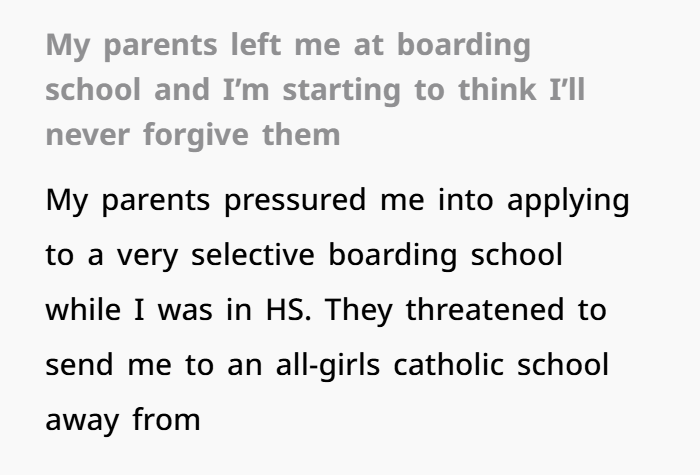
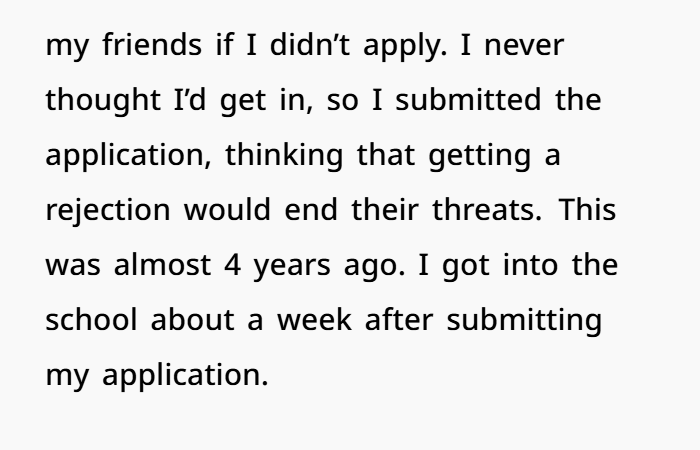
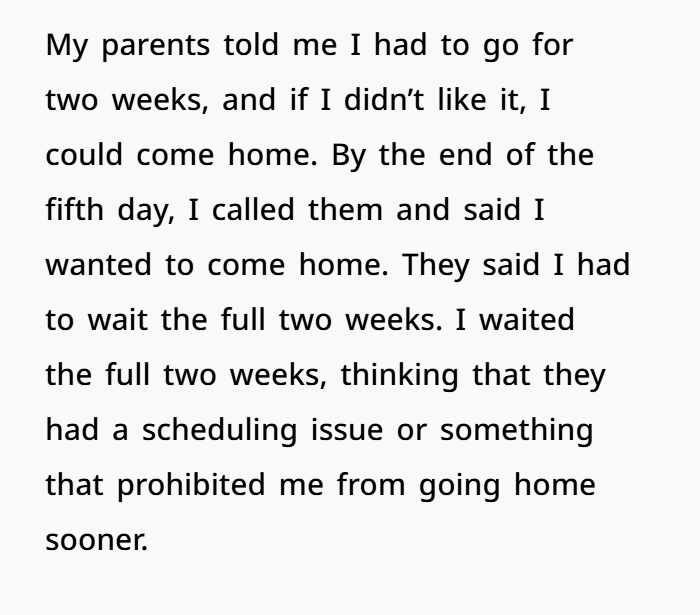

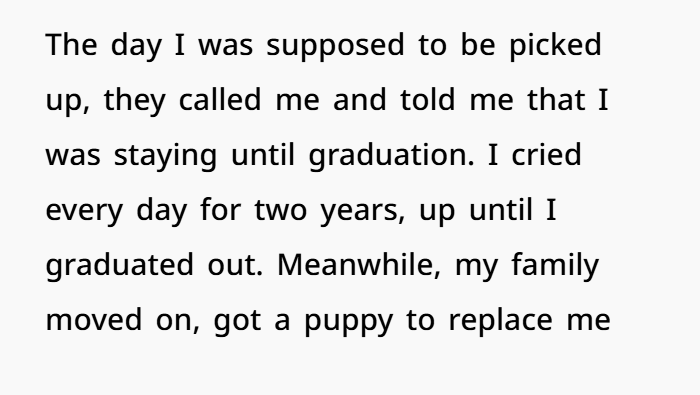
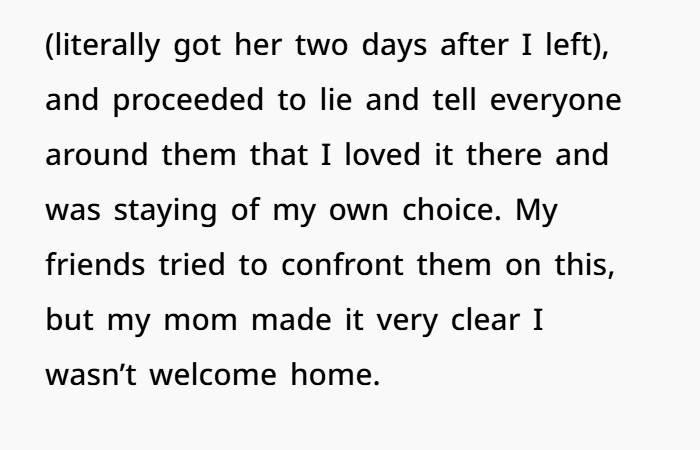
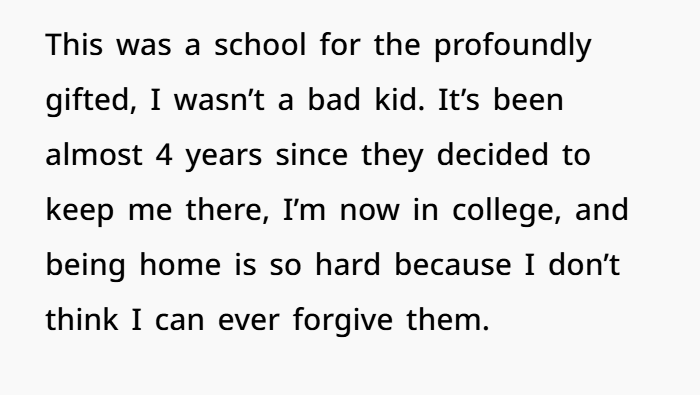
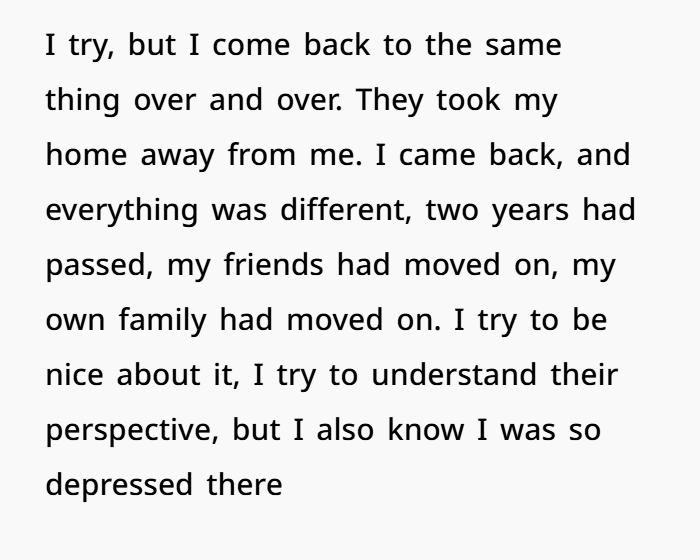
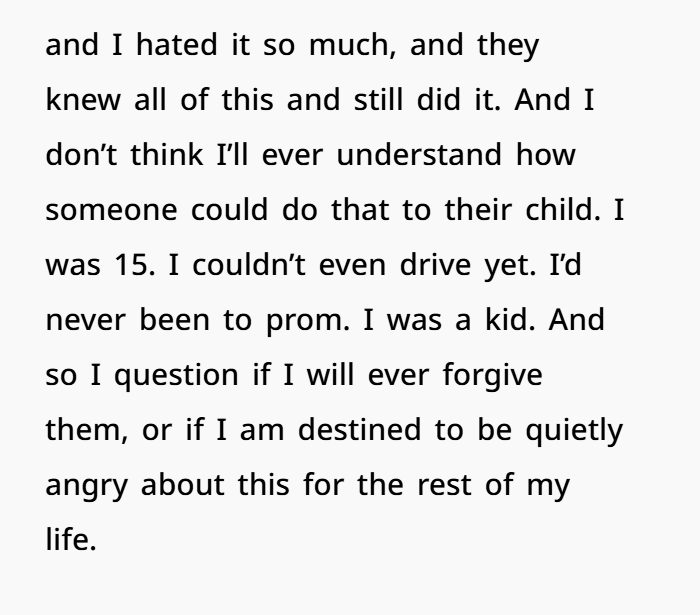
You’re carrying a wound. Let’s unpack what’s going on, what the research says about this kind of experience, and whether forgiveness is even possible—or necessary.

Emotional impact: loss of home, identity, belonging
Being placed in a boarding school at 15 against your will is more than a school change. At that age you’re still deeply connected to your home, friends, familiar routines. When your parents took you out of that without your full consent (or with hidden conditions) you suffered a rupture of safety. There’s a concept called “boarding school syndrome” — researchers say children who were separated from parents through boarding arrangements often experience lifelong issues such as difficulty trusting, feeling abandoned, questioning belonging. Caldaclinic
In your story: you lost the home you knew. You froze for two years. Your friends kept living; time moved on without you. That kind of injustice, that kind of forced removal, seeds anger.
Also, your parents lying to others (“she chose to be there”, “she loves it”) adds betrayal. It’s not just “you’re away”—it’s “we pretend you’re fine while ignoring your pain.” That deepens the wound.
Parents’ authority and the question of agency
Legally, parents generally have the broad authority to make educational decisions for minors— including boarding school placement. JustAnswer This means what happened may not have been illegal, but legality isn’t the only measure of harm. Your experience wasn’t simply “school change,” it was “I will remove your choice, and ignore your distress.”
When your parents promised “two weeks if you don’t like it you can come home,” they created agency—you believed you had it. Then they pulled it away. The sudden removal of agency is traumatic.
Research on forced transitions in adolescence shows the loss of control can lead to depression, resentment, identity issues. Even if your parents had “good intentions,” the way you experienced it matters: you felt powerless.
Forgiveness: what it is, what it isn’t
You ask: will I ever forgive them? Let’s break “forgiveness” into parts and what the key keywords around it suggest: emotional healing, letting go, acceptance, resentment resolution, boundary setting.
Forgiveness doesn’t mean: “I excuse what you did,” or “I go back to trusting you like before.” It can mean: “I stop letting your action hold me hostage emotionally.”
Many therapists argue forgiveness is for your own sake—to stop the resentment from controlling you (which in turn drains your mental health). Experts suggest: holding on to bitterness is worse for the bearer than the target. Bored Panda+1
So yes—you can forgive without forgetting, and even if your parents never acknowledge or validate your pain.
But refusing to forgive doesn’t condemn you forever either—it means you have extra emotional weight. You can choose to manage the anger rather than just let it silently eat away at you.

Anger and quiet resentment: is that ok?
You say: “I don’t think I’ll ever stop being quietly angry.” That feeling is valid. You were hurt deeply when you were at your most vulnerable.
Therapy literature says: unresolved resentment can manifest as trust issues, difficulty forming intimate relationships, low self‑esteem, chronic sadness. Maybe you’ve already experienced some of that.
The keyword “trauma boarding school separation” connects: the longer the unprocessed hurt persists, the more it seeps into your adult life. The good news: awareness is the first step. You’re aware. You’re processing. You’re reflecting. That matters.
Anger can also be a signal—it tells you what you value: safety, being seen, choice. Your anger is like a red flag: “That should not have happened to me.” Use it as a doorway instead of a prison.
Steps toward healing: practical strategies
- Acknowledge the injustice: Write down how you felt, what you lost, how it impacted you. Naming the hurt makes it less vague and less haunting.
- Give voice: Consider talking (therapist, trusted friend, support group) about the betrayal, the loss of home/friends/family continuity. Isolation magnifies resentment.
- Set boundaries: Forgiveness doesn’t require reconciling with your parents on their terms. You may choose limited contact, or reshaped relationships. That’s okay.
- Define your meaning: You were forced into something you didn’t want. Now you get to decide who you are, what you do with your education, your friendships, your home. That power is now yours.
- Focus on agency now: At 15 you had little. Now, you’re in college. You are reclaiming. Use that reclaimed control to build the life you were denied.
- Consider forgiveness as a process: It may take months or years. It often is non‑linear. Some days you’re okay, some days the hurt hits you strong. That’s normal.
- Mind your mental health: The emotional weight of this kind of experience may mean you’re more prone to depression or anxiety. Seek help if you feel stuck, hopeless, or if the anger turns into numbness.
Will you ever fully forgive? Maybe. Or maybe not in the way you imagine.
Full forgiveness might mean: you look at your parents without the heavy sting of betrayal. You accept they made a decision, you understand your part (you were powerless), you release the dominant emotional charge. You might never “trust them completely” or feel what a truly safe childhood could have been—but you can be freed from the “silently angry all the time” prison.
If you choose not to forgive, you can still choose not to let resentment run your life. You can decide: “I’m building my life now. I will not let past betrayal stop me from seeing what’s ahead.”
Either way, you are not “destined” to be quietly angry forever unless you let it, and the fact you’re asking these questions means you’re already moving toward healing.
In the comments, readers encouraged the original poster not to suffer in silence but rather to tell her parents exactly how much pain they caused her
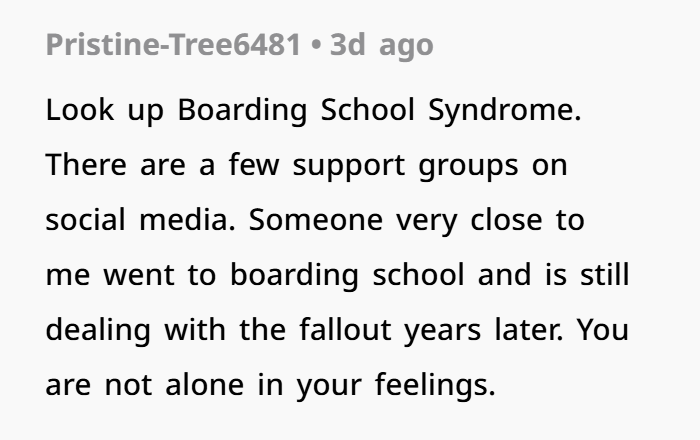
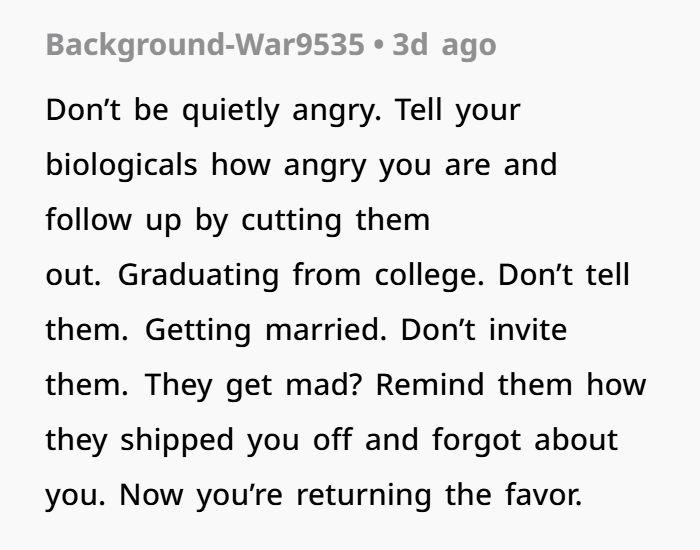
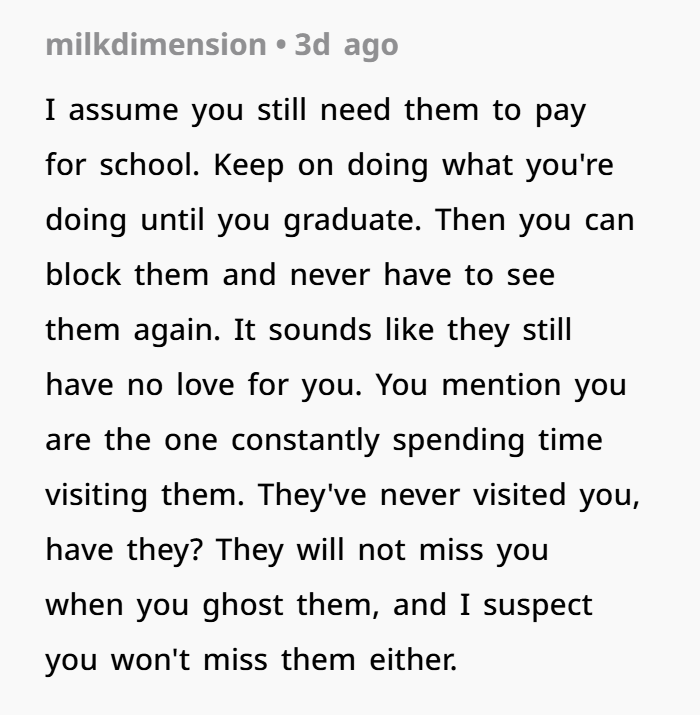


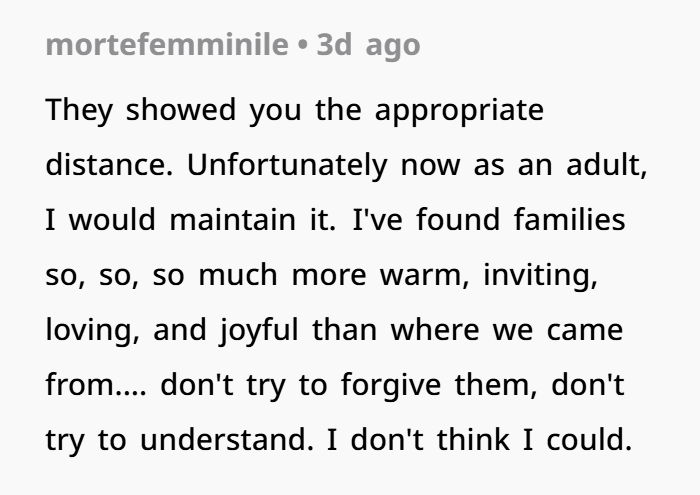
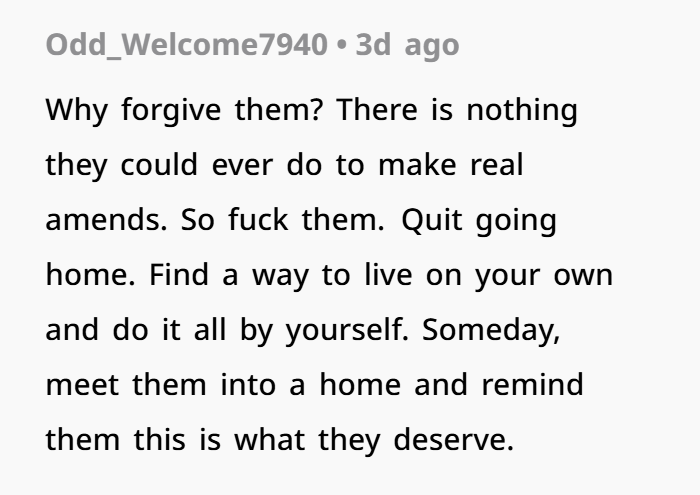
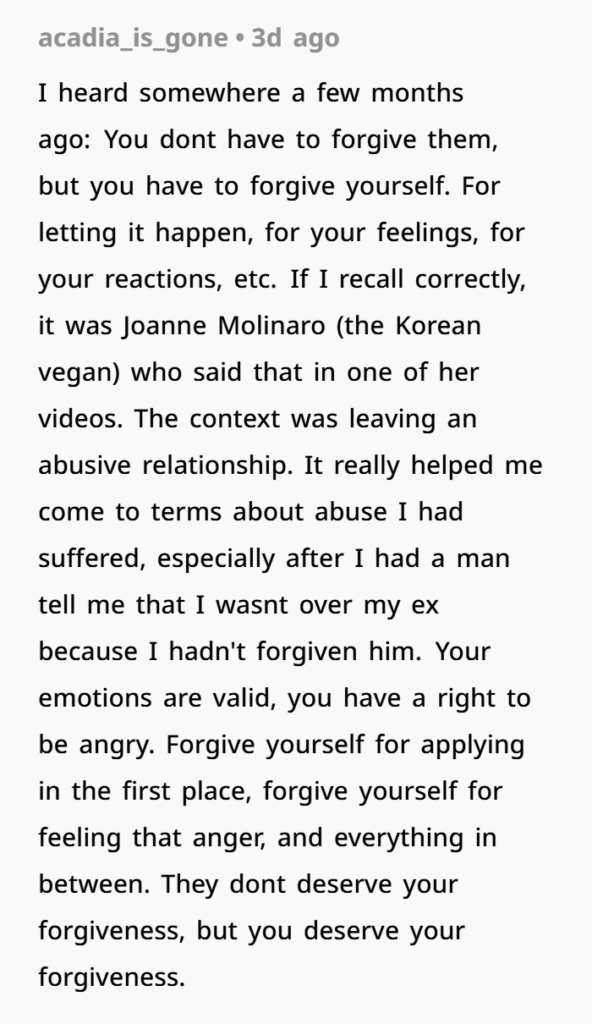
Your pain is valid. Your anger is valid. The loss you experienced isn’t “just boarding school,” it was a sense of home stolen at a formative age. That leaves a legacy. But it doesn’t have to sentence you. You can choose your response.
Forgiveness isn’t obligatory. It’s optional. But healing is essential. And healing doesn’t mean what happened is okay—it means you refuse to let what happened define your future.
When you feel the quiet anger rising, remind yourself: “That was not my fault. I didn’t ask for this. Now I get to decide what comes next.”
Whenever you feel stuck, come back to the steps: acknowledge the hurt, give it voice, reclaim your agency, set boundaries, and define your own path forward.
You’ve already started that journey by saying it out loud. That’s powerful.

